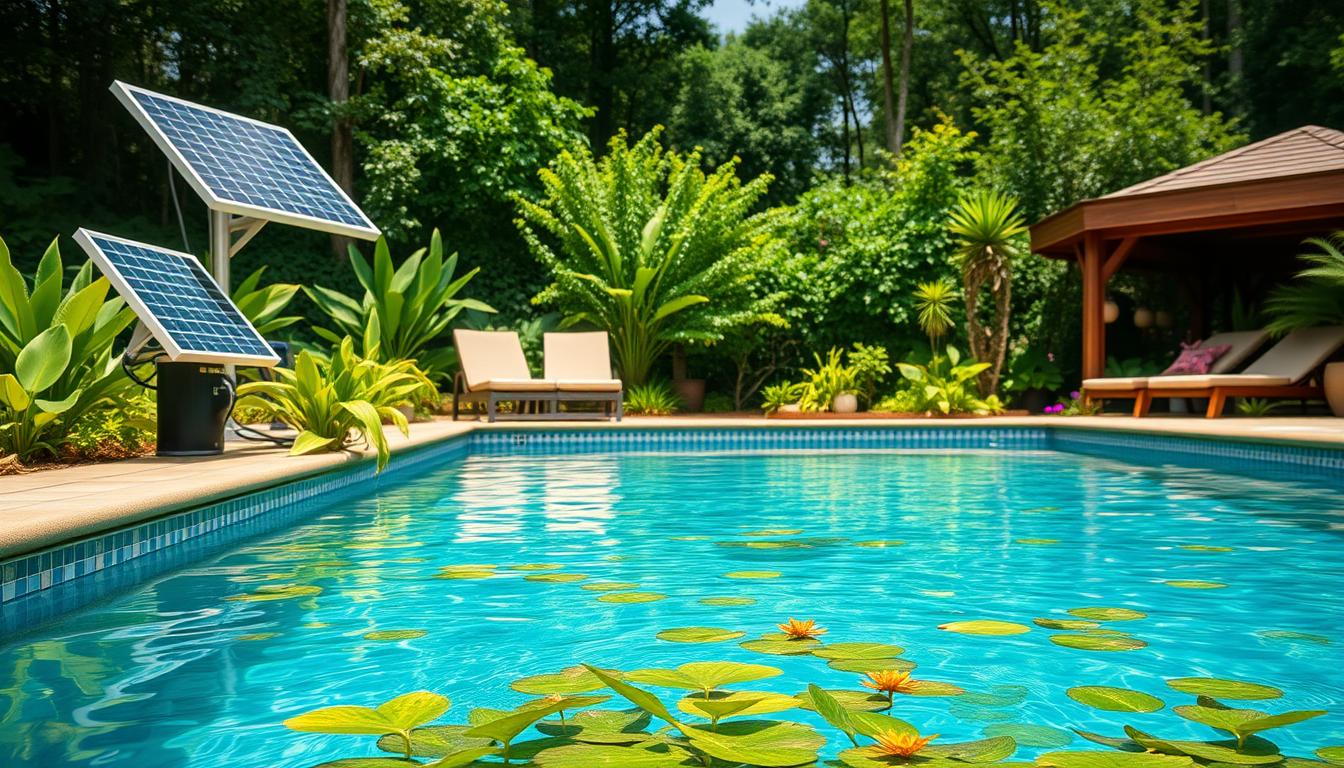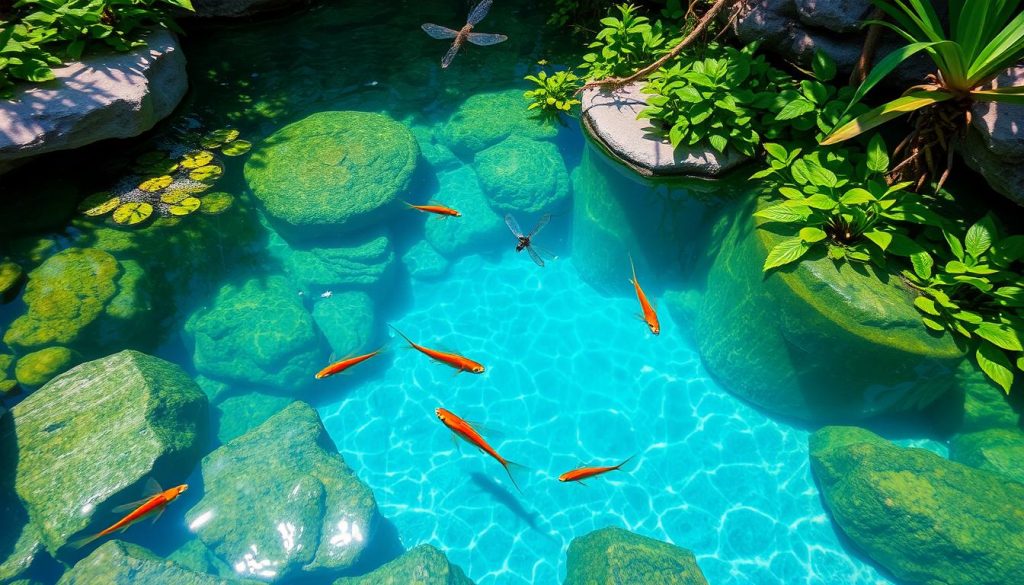
Want a clean pool without harsh chemicals? Natural, eco-friendly options can maintain water quality safely. Let’s explore chemical-free ways to keep your pool pristine and enjoyable.
These methods protect your health and the environment. They’re perfect for those sensitive to traditional pool chemicals.
Chlorine can cause skin irritation and breathing problems. It’s especially harmful to children and sensitive swimmers.
More pool owners now prefer non-toxic alternatives. These eco-friendly options reduce environmental impact while ensuring a clean swimming experience.
Key Takeaways
- Natural pool cleaning methods can effectively maintain water quality without relying on harsh chemicals.
- Eco-friendly water treatment options, such as ozonators and ionizers, reduce the need for traditional pool chemicals.
- Regular cleaning routines, leveraging natural sunlight, and optimizing pool usage minimize contaminants.
- Implementing seasonal care strategies helps maintain a clean, chemical-free pool year-round.
- Switching to eco-friendly pool care solutions may require an initial investment but leads to long-term savings on chemical costs and maintenance.
Understanding Your Pool’s Natural Ecosystem
Every pool has its own unique ecosystem. When balanced, it can reduce the need for harsh chemicals and mechanical filtration. Nature’s power creates a self-sustaining pool environment that maintains water quality with minimal intervention.
Let’s explore the key components of a natural pool ecosystem. We’ll see how they contribute to sustainable pool sanitation.

Natural Filtration: Utilizing Aquatic Plants
Aquatic plants are crucial for a healthy pool ecosystem. They absorb nutrients that would fuel algae growth. By adding various aquatic plants, you create a beautiful living filtration system.
The four main types of aquatic plants used in natural pools are:
- Emergent plants: Rooted in the substrate with leaves and stems above the water surface, such as cattails and rushes.
- Submerged plants: Growing entirely underwater, these plants release oxygen and absorb nutrients, like hornwort and water lilies.
- Floating plants: Not rooted in the substrate, these plants float freely on the water surface, such as water lettuce and water hyacinth.
- Marginal plants: Growing in shallow water or along the edges of the pool, these plants include irises and pickerelweed.
Strategic placement of these plants creates a stunning natural filtration system. This reduces the need for chemical treatments in your pool.
The Role of Biofilters in Maintaining Water Quality
Biofilters are essential for a natural pool ecosystem. They use beneficial bacteria to break down organic matter into harmless compounds. Biofilters can be added to your pool design in various forms:
- Gravel beds: A layer of gravel or other porous material that houses beneficial bacteria, acting as a biological filter.
- Plant-based biofilters: Aquatic plants with extensive root systems that provide a surface area for beneficial bacteria to colonize.
- Dedicated biofilter units: Stand-alone units that can be integrated into your pool’s circulation system, providing a concentrated area for bacterial filtration.
Biofilters maintain excellent water quality without harsh chemicals. They work with aquatic plants to create a self-sustaining pool environment.
| Pool Type | Installation Cost (per sq. ft.) | Maintenance Cost |
|---|---|---|
| Natural Swimming Pool | $50 – $100 | Lower long-term costs |
| Traditional Chlorine Pool | $30 – $50 | Higher ongoing costs |
Natural swimming pools have higher initial costs than traditional pools. However, they offer long-term savings on maintenance and chemicals. This makes them an attractive eco-friendly option.
By optimizing your pool’s ecosystem, you create a beautiful, healthy swimming environment. This sustainable approach requires minimal chemical intervention and provides lasting benefits.
Implementing Eco-Friendly Water Treatment Options
Eco-friendly pool treatments are gaining popularity for sustainable swimming experiences. Natural pool purification methods maintain clear water while reducing environmental impact. These solutions promote swimmer well-being and minimize the use of harsh chemicals.
The Benefits of Ozonators in Pool Sanitation
Ozonators are effective eco-friendly water treatment options for pools. They use ozone to sanitize water, reducing the need for chlorine-based systems. Ozone is a powerful oxidizer that offers several advantages.
Ozonators decrease chlorine usage, leading to fewer skin and respiratory issues. They improve water clarity and enhance the oxidation of contaminants. These systems work well with other eco-friendly pool treatments.
- Reduced chlorine usage, leading to fewer skin irritations and respiratory issues
- Improved water clarity and overall pool aesthetics
- Enhanced oxidation of contaminants and organic matter
- Compatibility with other eco-friendly pool treatments for a comprehensive approach
Ozone systems require an initial investment but offer long-term savings. They reduce chemical costs and positively impact swimmer health. This makes them a great choice for sustainable pool care.
Harnessing the Power of Ionizers for Algae and Bacteria Control
Ionizers offer another natural pool purification method to combat algae and bacteria growth. They release copper and silver ions into the water. This creates an environment where microorganisms can’t thrive.
Ionizers provide a non-toxic approach to algae and bacteria control. They reduce the need for harsh chemicals, promoting a gentler swimming experience. These devices also help maintain water clarity for longer periods.
- Natural and non-toxic approach to algae and bacteria control
- Reduced dependence on harsh chemicals, promoting a gentler swimming experience
- Longer-lasting pool water clarity and reduced maintenance requirements
- Compatibility with other eco-friendly pool treatments for a comprehensive approach
| Eco-Friendly Pool Treatment | Key Benefits |
|---|---|
| Ozonators | Reduced chlorine usage, improved water clarity, enhanced oxidation of contaminants |
| Ionizers | Natural algae and bacteria control, reduced dependence on harsh chemicals, longer-lasting water clarity |
Ozonators and ionizers create a sustainable, health-conscious swimming environment. These non-toxic pool disinfection methods reduce risks from traditional chemicals. They also contribute to global efforts for a cleaner, greener future.
How to Keep a Pool Clean Without Chemicals: Practical Tips and Techniques
Keeping your pool clean without harsh chemicals is possible. You can do this by cleaning regularly and using natural methods. This approach promotes an eco-friendly and sustainable pool environment.
By following these tips, you’ll enjoy refreshing swims in a clean pool. You’ll also reduce your environmental impact and create a healthier swimming space.
Regular Cleaning and Maintenance Routines
Consistent cleaning is key to a chemical-free pool. Adopt these green alternatives in your routine. They’ll help maintain a clean, healthy pool without harsh chemicals.
Leveraging Natural Sunlight for Algae Control
Sunlight is a powerful tool for controlling algae in your pool. It can naturally disinfect the water and prevent algae growth. Here’s how to use sunlight effectively:
Optimizing Pool Usage to Minimize Contaminants
How you use your pool affects its cleanliness. Adopt these practices to keep contaminants at bay. They’ll help maintain water quality without chemical treatments.
Implementing Seasonal Care Strategies
Seasonal care is crucial for a clean, balanced pool without chemicals. Consider these organic cleaning solutions. They’ll help you maintain your pool year-round without harsh chemicals.
Conclusion
Clean, healthy pools without harsh chemicals are possible. Natural ecosystems and eco-friendly techniques create sustainable swimming environments. Aquatic plants and biofilters help maintain water quality, reducing chemical needs.
Ozonators and ionizers offer effective alternatives to chemical sanitizers. These systems control algae and eliminate bacteria for safe swimming. Regular cleaning routines are crucial for a pristine pool.
Optimizing pool usage and seasonal care strategies contribute to chemical-free maintenance. Natural sunlight and shade help minimize algae growth. With the right approach, pool owners can enjoy clean water.
Eco-friendly practices reduce environmental impact while maintaining sparkling pools. Embracing natural cleaning methods is a responsible and rewarding way to care for your pool.







